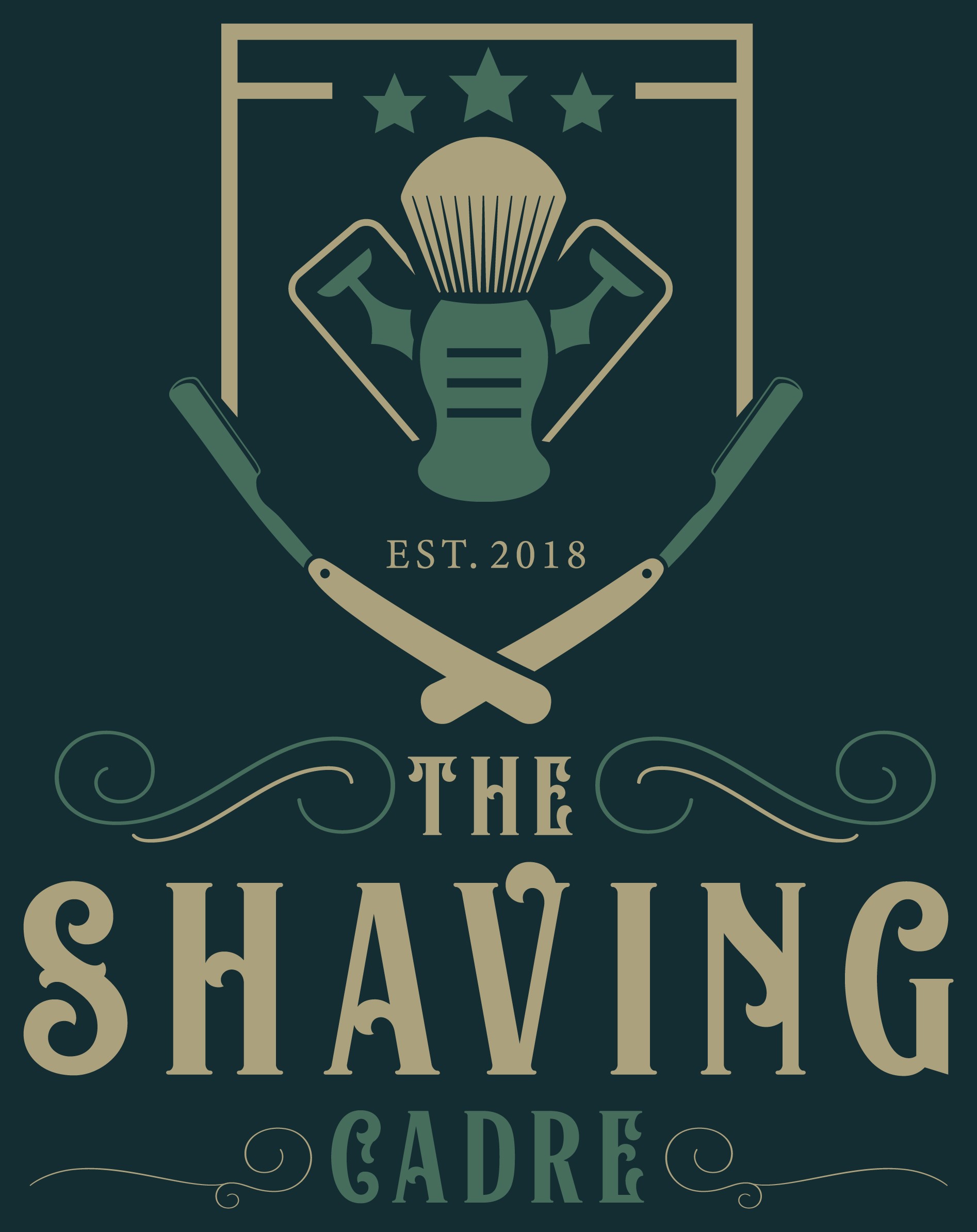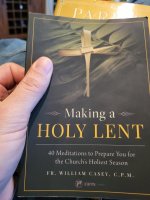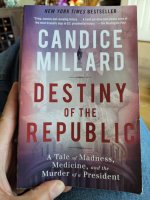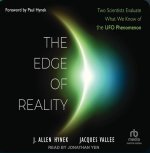The Shaving Cadre
You are using an out of date browser. It may not display this or other websites correctly.
You should upgrade or use an alternative browser.
You should upgrade or use an alternative browser.
The Reading Lounge
- Thread starter dangerousdon
- Start date
woodpusher
TSC’s International Man of Meh
^^^
BabbaDabbid's "Field & Stream"
BabbaDabbid's "Field & Stream"
Yes Sir, LOL^^^
BabbaDabbid's "Field & Stream"
Yep the mag where cigar makers pay to be ranked LOL
I just get it for the centerfoldYep the mag where cigar makers pay to be ranked LOL
I knew you liked Steph Curry, but geezeI just get it for the centerfold
I read this book for the second time.
Stephen King while I can't stand his politics he is an excellent story teller, and this book is fantastic!
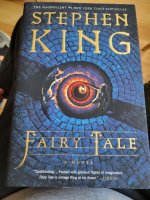
I am usually always reading something nonfiction and Candice Millard does an amazing job. This the 3rd book of hers I have read I highly recommend her work. She does a great job telling the story and sticking to the facts.

Now it's time to prepare for lent.
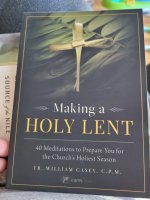
Stephen King while I can't stand his politics he is an excellent story teller, and this book is fantastic!

I am usually always reading something nonfiction and Candice Millard does an amazing job. This the 3rd book of hers I have read I highly recommend her work. She does a great job telling the story and sticking to the facts.

Now it's time to prepare for lent.

woodpusher
TSC’s International Man of Meh
After being impressed with David Brooks' most recent book (see here ... The Reading Lounge), I picked up one he wrote a few years ago, The Road to Character. It's basically a story of what Brooks calls Adam-1 vs Adam-2, where Adam-1 is the person we deem a success based on their accomplishments and achievements and Adam-2 is the person we deem a success based on their character. I.E. WHO they are rather than WHAT they do for a living.
The premise start off very nice and the books presents a chapter focusing mainly on a single person and the self-control and/or sacrifices they made to become a person of good moral character rather than one who chased the spotlight and success.
Alas, that is THE best aspect of the book. The other two major things that came through the writing to me were:
a) Brooks switches often between writing for the common person and then suddenly injecting terms such as "inculcates" when the simple "instills" would suffice. These moments happened enough that I was put in mind of Nassim Nicholas Taleb (author of Fooled By Randomness and several other VERY good books), who wants to impress their intellect upon the reader.
b) God, God, God and God. Just about every single story in the book revolves around striving to be good and of moral character, often self-sacrificing to serve God's will. The takeaway I got is that only people with a deep religious conviction or are striving for such can achieve the Adam-2 goals of good character. I understand that Brooks was going through some soul-searching of his own at the time, converting from Judaism to Christianity, but even so, I'm sure this theme didn't need to be so prominent.
These two things were distracting enough that sometimes the main theme of the chapter's character's struggle became secondary and got lost in the mix. Still ......
Verdict: Worth a read
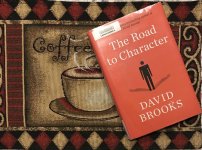
The premise start off very nice and the books presents a chapter focusing mainly on a single person and the self-control and/or sacrifices they made to become a person of good moral character rather than one who chased the spotlight and success.
Alas, that is THE best aspect of the book. The other two major things that came through the writing to me were:
a) Brooks switches often between writing for the common person and then suddenly injecting terms such as "inculcates" when the simple "instills" would suffice. These moments happened enough that I was put in mind of Nassim Nicholas Taleb (author of Fooled By Randomness and several other VERY good books), who wants to impress their intellect upon the reader.
b) God, God, God and God. Just about every single story in the book revolves around striving to be good and of moral character, often self-sacrificing to serve God's will. The takeaway I got is that only people with a deep religious conviction or are striving for such can achieve the Adam-2 goals of good character. I understand that Brooks was going through some soul-searching of his own at the time, converting from Judaism to Christianity, but even so, I'm sure this theme didn't need to be so prominent.
These two things were distracting enough that sometimes the main theme of the chapter's character's struggle became secondary and got lost in the mix. Still ......
Verdict: Worth a read

Was able to finally read a non-fiction book for the first time in a very long time and I was really surprised! Ready Player One by Ernest Cline. And I have to tell you...WAY better than the movie. Also, it's pretty much an homage to Gen Xers everywhere. Pretty well written. So much that I will likely pick up Ready Player Two in the near future.
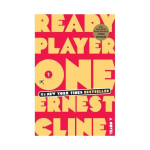

woodpusher
TSC’s International Man of Meh
I finished reading The Tenant Class a few days ago, but life has been busy so I am only getting around to posting about now.
The base premise of this ~100p book is that there is no housing crisis in Canada (but the same could apply to the US as well), but rather that the system is working as designed to help the rich get richer and keeping the poor, poor.
His solution is that tenants need to formally unionize or at least form organizations and, when confronted by bad landlords who either raise rents or don't perform repairs, go on rent strikes. "Raising rents" means exactly that, even by 0.01%, and even more so, if the rent is more than the cost to upkeep the property (taxes, insurance, and maintenance), then a rent strike is in order. The author keeps referencing Marx and Marxist doctrine, so that should help you understand his underlying perspective.
He also advocates the government buying homes on the retail market and turning them into affordable housing rental units.
Verdict: Not worth the read as it is not a discussion but more like a rant

Here's a sample...
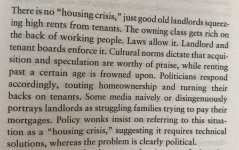
The base premise of this ~100p book is that there is no housing crisis in Canada (but the same could apply to the US as well), but rather that the system is working as designed to help the rich get richer and keeping the poor, poor.
His solution is that tenants need to formally unionize or at least form organizations and, when confronted by bad landlords who either raise rents or don't perform repairs, go on rent strikes. "Raising rents" means exactly that, even by 0.01%, and even more so, if the rent is more than the cost to upkeep the property (taxes, insurance, and maintenance), then a rent strike is in order. The author keeps referencing Marx and Marxist doctrine, so that should help you understand his underlying perspective.
He also advocates the government buying homes on the retail market and turning them into affordable housing rental units.
Verdict: Not worth the read as it is not a discussion but more like a rant

Here's a sample...

beginish
The Dr. Who of the TSC
I finished reading The Tenant Class a few days ago, but life has been busy so I am only getting around to posting about now.
The base premise of this ~100p book is that there is no housing crisis in Canada (but the same could apply to the US as well), but rather that the system is working as designed to help the rich get richer and keeping the poor, poor.
His solution is that tenants need to formally unionize or at least form organizations and, when confronted by bad landlords who either raise rents or don't perform repairs, go on rent strikes. "Raising rents" means exactly that, even by 0.01%, and even more so, if the rent is more than the cost to upkeep the property (taxes, insurance, and maintenance), then a rent strike is in order. The author keeps referencing Marx and Marxist doctrine, so that should help you understand his underlying perspective.
He also advocates the government buying homes on the retail market and turning them into affordable housing rental units.
Verdict: Not worth the read as it is not a discussion but more like a rant
View attachment 128593
Here's a sample...
View attachment 128594
I think it’s good to read books like this, if only to read in detail about perspectives different from my own.
woodpusher
TSC’s International Man of Meh
Indeed. Alas, this is pretty much a one-sided presentation and doesn't offer anything even remotely counterbalancing from the other side. I do agree 100% that Canadian federal and provincial governments (wrongly IMO) abandoned constructing social housing bank in the 80s and the imposition of rent controls, while seemingly good on the surface for tenants, brought the construction of purpose-built rentals (low/mid/high rise) to a near standstill for 40 years.I think it’s good to read books like this, if only to read in detail about perspectives different from my own.
My biggest issue with the book is that he is dismissive of solutions that involve building more units, but says that existing units are simply owned by the wrong people (capitalists) and if rent is directly controlled by government then issues will be solved. My take on things is the we need to have MANY more rentals built (density, density, density!) as well as controls put in place around the numerous renovictions we see happening by corporations (i.e. REITs and such).
BTW I am a home owner but will rent later on either when we a)can no longer care for our property, or b) are travelling enough that a turn-key rental (may be a condo) makes more sense. My 87 year old mom is also a renter, so I can empathize with many tenants.
woodpusher
TSC’s International Man of Meh
I recently finished Nicolas Bérubé's From Zero to Millionaire as he was a guest on a podcast that I listed to regularly. It only took about 3 hours to finish it, as all of the material was a review for me. It's basically about using passive Index ETFs and to forget about stock picking to beat the market. The best way I can describe this book is to say that it is a much lighter version of Burton Malkiel's classic, A Random Walk Down Wall Street.
Verdict: A solid, simple read.
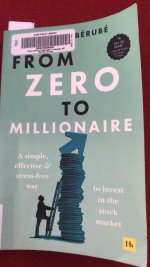
Verdict: A solid, simple read.

woodpusher
TSC’s International Man of Meh
I just finished reading The God Delusion by Richard Dawkins (no, not the Hogan's Heroes, Family Feud, and Running Man guy) and it took about three weeks for me to get through it. That's a LOT longer than normal for me and it doesn't count the two weeks I was on vacation in Portugal. The writing style is different than what I expected and is more akin to the transcripts of a series of persuasive/argumentative lectures or someone trying to convince you of something at a pub over a few beers Guinness, and that's simply why my time with the book dragged on. I was hoping for a more intellectual writing style and was let down.
Just in case you have not heard of it before, it is an attempt to show how silly, misguided and damaging religion is and how a 100% scientific view of the world is much better .
That said, there are a lot of intellectual arguments being made but I found all too often that his method of proving there is no God is to try to demonstrate that things(e.g. morals) would function the same without religion and therefore, religion is not the cause and therefore, morals cannot be something attributed to God. And as such, if God isn't responsible for morals, what else is he/she not responsible for that we currently credit to a greater power? Of course, I am simplifying his argument, but the same thing keeps popping up.
In a similar note, when crediting science for something, he often goes through points a, b, c and says that there are many more such points showing scientific reasons are more valid than theological ones for such and such an item, but says to trust him that there is no need to lay out further proof.
In effect, the same way he dismisses many religious things, he uses the same "no proof" to ask for agreement in his pro-science arguments. I thought it strange that in his dismantling of religious faith, he asks for belief/faith in many of his argued but unproven points.
In my view, the book will not convert people of faith, may or may not swing some agnostics towards atheism, and will be an echo-chamber for those who already hold atheistic views.
Verdict: Hard to recommend, unless you're already leaning towards atheism.
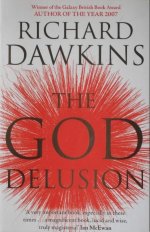
Just in case you have not heard of it before, it is an attempt to show how silly, misguided and damaging religion is and how a 100% scientific view of the world is much better .
That said, there are a lot of intellectual arguments being made but I found all too often that his method of proving there is no God is to try to demonstrate that things(e.g. morals) would function the same without religion and therefore, religion is not the cause and therefore, morals cannot be something attributed to God. And as such, if God isn't responsible for morals, what else is he/she not responsible for that we currently credit to a greater power? Of course, I am simplifying his argument, but the same thing keeps popping up.
In a similar note, when crediting science for something, he often goes through points a, b, c and says that there are many more such points showing scientific reasons are more valid than theological ones for such and such an item, but says to trust him that there is no need to lay out further proof.
In effect, the same way he dismisses many religious things, he uses the same "no proof" to ask for agreement in his pro-science arguments. I thought it strange that in his dismantling of religious faith, he asks for belief/faith in many of his argued but unproven points.
In my view, the book will not convert people of faith, may or may not swing some agnostics towards atheism, and will be an echo-chamber for those who already hold atheistic views.
Verdict: Hard to recommend, unless you're already leaning towards atheism.

